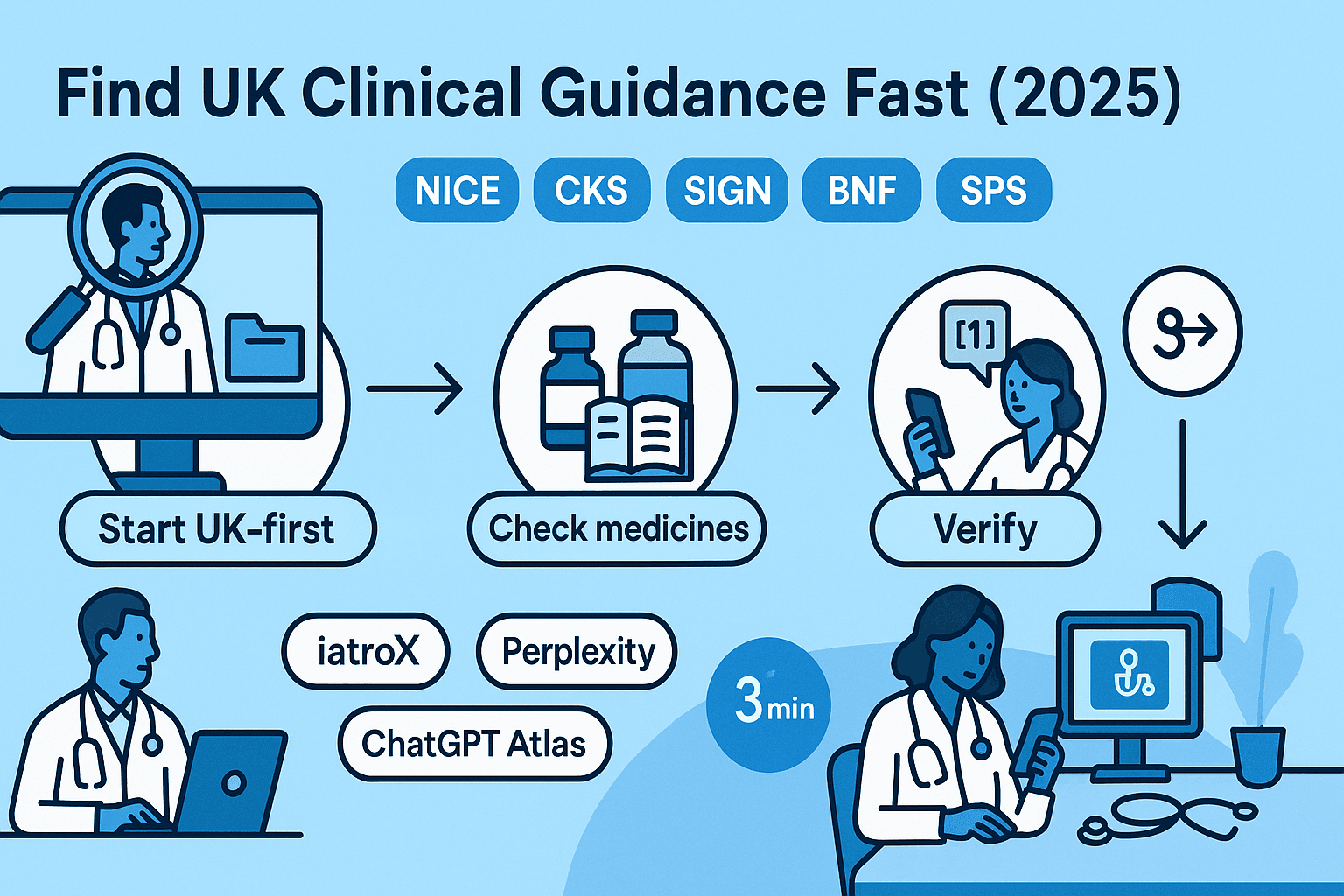Executive summary
For a busy UK clinician, finding the right, up-to-date clinical guideline in a hurry is a daily challenge. The solution is no longer a single bookmark, but a hybrid workflow. This guide provides a practical blueprint for 2025 on how to combine authoritative UK sources (NICE, CKS, SIGN, BNF, SPS), smart search operators, and a new generation of citation-first AI assistants like the iatroX Knowledge Centre, Perplexity, and ChatGPT Atlas. This approach allows you to cut your search time from minutes to seconds, while critically preserving the provenance and verifiability of the information you use to make decisions.
What counts as a “guideline” (and why provenance matters)
Before you search, it's important to know what you're looking for. The UK ecosystem has several layers:
- NICE Guidelines (NG): Comprehensive, evidence-based national recommendations that define policy and care pathways.
- NICE CKS (Clinical Knowledge Summaries): Pragmatic, point-of-care summaries for primary care, designed for rapid "what to do now" answers.
- SIGN Guidelines: Rigorous, methodology-heavy guidelines from Scotland that are widely respected across the UK.
- BNF/BNFC: The definitive source for medicines, dosing, and interactions.
The UK must-knows (bookmark these)
These are the foundational, non-negotiable sources for UK clinical practice.
- NICE Guidance: The single source of truth for national recommendations.
- NICE CKS: The best starting point for over 370 common primary care presentations.
- SIGN: For high-quality guidelines, particularly those that complement NICE.
- BNF/BNFC: The definitive reference for prescribing.
- SPS (Specialist Pharmacy Service): The NHS's "first stop" for complex medicines Q&As, PGDs, and legal frameworks.
AI tools that speed up guideline discovery (with citations)
A new generation of AI assistants can act as a fast "front door" to this information.
- iatroX Knowledge Centre: A free, UK-centric, and UKCA-marked clinical assistant. It acts as a curated "front door," providing conversational, cited answers from a "walled garden" of authoritative UK guidance (like NICE and SIGN) and peer-reviewed research. It is designed to help you find relevant information quickly.
- Perplexity: A powerful "answer engine" with a "Deep Research" mode that can synthesise information from multiple web searches. It is excellent for finding the latest updates or guideline landscapes, but you must check that its citations point to authoritative UK sources.
- ChatGPT Atlas: A new browser from OpenAI that includes a ChatGPT sidebar. This allows you to summarise or query a specific guideline page you are already on, which can be useful for extracting key information from a dense document.
- OpenEvidence: A clinician-oriented AI search engine that is free for verified healthcare professionals. It is focused on synthesising evidence from peer-reviewed sources and is useful for finding the evidence behind a guideline.
- Trip Database: A long-standing clinical meta-search engine that intelligently filters results to show you guidelines and systematic reviews first.
- Consensus (Medical Mode): An AI search tool that can be restricted to search only medical literature and a database of ~50,000 clinical guidelines.
Classic clinical decision support (CDS) you may already have
- BMJ Best Practice: Freely available to all NHS staff via OpenAthens, this is a world-class resource for step-by-step guidance on diagnosis and management. Its app also has an excellent offline mode.
- DynaMed / DynaMedex: A leading point-of-care reference, known for its concise summaries and daily literature surveillance. It is now rolling out its own AI assistant, Dyna AI.
- UpToDate: A comprehensive narrative-based reference, which is also rolling out its UpToDate Expert AI features to provide conversational answers from its corpus.
Search like a pro: time-saving operators & filters
You can force your search engine to look in the right places by using simple operators:
site:nice.org.uk guidance diabetes "NG"- This will only search the NICE website for guidance pages that mention "diabetes" and "NG".site:sps.nhs.uk "patient group direction"- This will find all PGD resources on the Specialist Pharmacy Service website.- On PubMed, use the "Article Type" filter and select "Practice Guideline" to narrow your search to formal guidelines, but be aware of publication delays.
A 3-minute “guideline sprint” workflow
- Start UK-first: Go directly to your primary source. For a common condition, open the NICE CKS topic page.
- Check medicines: If the query is medicines-heavy, cross-check the dose and monitoring requirements in the BNF or on the SPS website.
- Broaden with AI: For a more nuanced question (e.g., "what about this comorbidity?"), use a UK-centric AI like the iatroX Knowledge Centre to get a cited summary.
- Verify: Always click the citations provided by the AI to read the primary source yourself before making a clinical decision.
Governance & good practice (UK)
- Prefer official sources and CDS tools like BMJ Best Practice that are provided via your institutional licence, as these have established audit and versioning controls.
- For any tool you use, get in the habit of documenting the source URL, guideline version, and the date you accessed it in your clinical notes or CPD log.
Quick-links directory (copy/paste for your browser)
- NICE Guidance:
https://www.nice.org.uk/guidance - NICE CKS:
https://cks.nice.org.uk/ - SIGN:
https://www.sign.ac.uk/ - BNF:
https://bnf.nice.org.uk/ - SPS:
https://www.sps.nhs.uk/ - Trip Database:
https://www.tripdatabase.com/ - BMJ Best Practice (NHS access):
https://access.bmjgroup.com/nhse/ - iatroX Knowledge Centre:
https://www.iatrox.com/knowledge-centre - Perplexity:
https://www.perplexity.ai/ - Consensus:
https://consensus.app/
FAQs
- Is an AI tool a replacement for NICE CKS?
- No. Authoritative sources like NICE CKS and the BNF are the ground truth. An AI tool is a "front door" that helps you search or synthesise information more efficiently, but you must always verify its output against the primary source.
- Is BMJ Best Practice free for NHS staff?
- Yes, it is nationally funded in England and accessible via your NHS OpenAthens login.
- Where should I check dosing/contraindications?
- The BNF/BNFC is the definitive source for all UK prescribing.
- Which AI tool is UK-centric and free?
- iatroX is a free, UK-centric platform that provides citation-first answers from authoritative UK guidance and peer-reviewed research.
